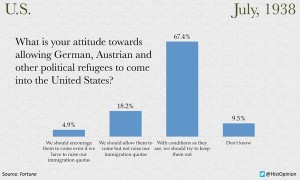This is a guest post by Robert Mather, Ph.D. Dr. Mather is a Professor of Psychology at the University of Central Oklahoma, where he directs the Interpersonal Processes and Social Cognition Lab and is the chair of the Institutional Review Board. He is a recognized expert in empirical social cognition research on automaticity and cognitive control, attitudes and persuasion, bias correction, stereotypes and discrimination, and leadership. This research has applications in management, consumer behavior, marketing, and forensic science. He has authored three books and over thirty articles.
On Accepting Refugees and Comparing Nazis to ISIS
 Yesterday, The Washington Post published an article entitled “What Americans Thought of Jewish Refugees on the Eve of World War II.” This article discussed attitudes that were surveyed in July of 1938 by Fortune Magazine regarding political refugees. Specifically, the question was “What is your attitude towards allowing German, Austrian and other political refugees to come into the United States?” The results showed that 4.9% agreed with “We should encourage them to come even if we have to raise our immigration quotas,” 18.2% agreed with “We should allow them to come but not raise our immigration quotas,” 67.4% agreed with “With conditions as they are, we should try to keep them out,” and 9.5% agreed with “Don’t know.” In 1939, a Gallup survey framed it this way: “It has been proposed to bring to this country 10,000 refugee children from Germany—most of them Jewish—to be taken care of in American homes. Should the government permit these children to come in?” Of respondents, 30% selected “yes,” 61% selected “no,” and 9% selected “no opinion.”
Yesterday, The Washington Post published an article entitled “What Americans Thought of Jewish Refugees on the Eve of World War II.” This article discussed attitudes that were surveyed in July of 1938 by Fortune Magazine regarding political refugees. Specifically, the question was “What is your attitude towards allowing German, Austrian and other political refugees to come into the United States?” The results showed that 4.9% agreed with “We should encourage them to come even if we have to raise our immigration quotas,” 18.2% agreed with “We should allow them to come but not raise our immigration quotas,” 67.4% agreed with “With conditions as they are, we should try to keep them out,” and 9.5% agreed with “Don’t know.” In 1939, a Gallup survey framed it this way: “It has been proposed to bring to this country 10,000 refugee children from Germany—most of them Jewish—to be taken care of in American homes. Should the government permit these children to come in?” Of respondents, 30% selected “yes,” 61% selected “no,” and 9% selected “no opinion.”
I don’t talk politics much, as I am a simple American social psychology professor who studies attitudes and persuasion. Explicit measures of attitudes are less reliable than implicit measures, and the 1938 and 1939 data have restricted sampling in their methodology (thus limiting the generalizability of those results). Those issues aside, these data have been making the social media rounds with the idea that Americans who are opposed to allowing Syrian refugees into the country are xenophobic. Social psychologists have volumes of evidence to support the fact that the in-group/out-group distinction is made automatically, and that in-group members don’t think highly of whatever out-groups they categorize. Sadly, xenophobia is the norm of the human condition, whether you live in the United States or anywhere else. As such, it is valuable for everyone to realize that whatever out-group you are dealing with isn’t likely to be as open-minded about you as you would like them to be.
 In 1938, the humane answer wasn’t to take in the Jewish refugees. That would have been a very short-sighted and incomplete solution to a much more complicated problem. It could be argued that it was one part of the humane answer, but the most humane answer was to go over to Germany with our military and a coalition of allies, and to kill Adolph Hitler and demolish the ideology of Nazism in 1938. Instead, we waited until the invasion of Pearl Harbor on December 7th, 1941 to become more highly involved. We as a nation had a responsibility to stand up to the bullies that created the refugees, rather than just take them in (although, again, that could certain be a part of the human solution). Destroying what created their status as refugees in the first place should have been our top obligation to European Jews and those they left behind in the Holocaust.
In 1938, the humane answer wasn’t to take in the Jewish refugees. That would have been a very short-sighted and incomplete solution to a much more complicated problem. It could be argued that it was one part of the humane answer, but the most humane answer was to go over to Germany with our military and a coalition of allies, and to kill Adolph Hitler and demolish the ideology of Nazism in 1938. Instead, we waited until the invasion of Pearl Harbor on December 7th, 1941 to become more highly involved. We as a nation had a responsibility to stand up to the bullies that created the refugees, rather than just take them in (although, again, that could certain be a part of the human solution). Destroying what created their status as refugees in the first place should have been our top obligation to European Jews and those they left behind in the Holocaust.
Put simply, if given the chance to go back in time, would the right move be to accept more refugees or to take the fight to Hitler’s legions in 1938, rather than 1941? The answer is obvious.
This is mirrored today in the uproar in the U.S. (and other nations) concerning letting Syrian refugees seek asylum in our country. Not unlike the anti-Semitic attitudes of those surveyed by Fortune over 70 years ago, the current anti-Islam attitudes in the United States are not only keeping the Syrian refugees from getting help here, they are also letting the bully create more refugees. This situation is akin to 1) being afraid to take in a battered woman for fear of reprisal from an abusive partner, and 2) irresponsibly allowing the abusive partner to keep abusing the kids and the next partner. Future Syrian refugees are still there and still suffering at the hands of ISIS. They will become future refugees if (and it’s a big if) they are lucky enough to escape the clutches of what ISIS has in store for them.
 So, while that similarity definitely exists between these two situations, there is a major difference. Briefly, European Jews fleeing the oncoming Holocaust were not harboring people who had very explicitly stated they would attack us. With the Syrian refugees, this is not the case, as ISIS has said attacking us is one of their main goals. That simple fact makes the comparison very different.
So, while that similarity definitely exists between these two situations, there is a major difference. Briefly, European Jews fleeing the oncoming Holocaust were not harboring people who had very explicitly stated they would attack us. With the Syrian refugees, this is not the case, as ISIS has said attacking us is one of their main goals. That simple fact makes the comparison very different.
My point is not to advocate war, nor to advocate the U.S. accepting Syrian refugees. Simple answers are few and far between when it comes to complicated human interactions and political issues. From my perspective as a social psychologist who maintains certain humanitarian values, I think that refugees that we can help should be helped and that we need to make sure the bad guys stay away. Unfortunately, this is easier said than done, I am not suggesting that war is the solution to stop ISIS, but it is their stated solution to stop us. Pontificating through social media on explicit attitude measures from a restricted sample of Fortune readers from 1938 in a less than ideal comparison does little more than make people entrenched in their limited views of the solution to the real problem. ISIS is coming here to kill us, and rather than emotionally and effortlessly resharing something on social media, we need a good plan based on good scientific data on how to stop them.
